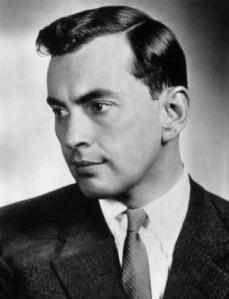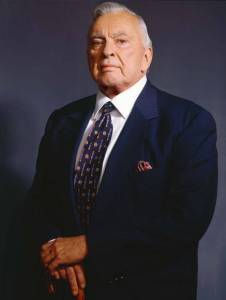 A number of liberal blogs are writing about the Times Online interview with Gore Vidal, focusing on Vidal’s disappointment with Barack Obama, and his claim now that Hillary Clinton would have made a better U.S. President. (I’m sure that’s what he thinks now, but there’s no question but that he would have said the same thing about Obama if Clinton were President now. Vidal is and always has been gimlet-eyed (to say the least!) about political power and the National Security State.) I found other remarks of his much more interesting. (Hint: here’s one for the Big Book of Transhistorical Gayness!)
A number of liberal blogs are writing about the Times Online interview with Gore Vidal, focusing on Vidal’s disappointment with Barack Obama, and his claim now that Hillary Clinton would have made a better U.S. President. (I’m sure that’s what he thinks now, but there’s no question but that he would have said the same thing about Obama if Clinton were President now. Vidal is and always has been gimlet-eyed (to say the least!) about political power and the National Security State.) I found other remarks of his much more interesting. (Hint: here’s one for the Big Book of Transhistorical Gayness!)
Vidal became a supportive correspondent of Timothy McVeigh, who blew up the Alfred P. Murrah Building in Oklahoma City in 1995 killing 168 people. The huge loss of life, indeed McVeigh’s act of mass murder, goes unmentioned by Vidal. “He was a true patriot, a Constitution man,” Vidal claims. “And I was torn, my grandfather [the Democrat Senator Thomas Gore] had bought Oklahoma into the Union.” McVeigh claimed he had done it as a protest against tyrannical government. The writer Edmund White took the correspondence as the basis for a play, Terre Haute (the jail McVeigh was incarcerated in before he was executed in 2001), imagining an encounter between the bomber and Vidal charged with desire.
“He’s a filthy, low writer,” Vidal says of White. “He likes to attack his betters, which means he has a big field to go after.” Had he wanted to meet McVeigh? “I am not in the business of meeting people,” Vidal says. “That play implies I am madly in love with McVeigh. I looked at his [White’s] writing and all he writes about is being a fag and how it’s the greatest thing on Earth. He thinks I’m another queen and I’m not. I’m more interested in the Constitution and McVeigh than the loving tryst he saw. It was vulgar fag-ism.”
Vidal, like Roy Cohn (imagine if Vidal ever saw that phrase!), is a man who has sex with men, but isn’t gay (or a “fag.”) By the way, I’m not mocking him or doubting him. I’m just noting both men’s rejection of the label or identity. In Cohn, I think it was rooted in a kind of self-loathing plus a heap of self-preservation, but in Vidal I think it’s actually part of a principled libertarianism and rejection of liberal identity politics. (Plus, maybe a little generationally-unavoidable self-loathing.) Also: I love that writerly competition in Vidal’s dismissal of White! Writers of Vidal’s generation were pugnaciously competitive–now, writers are always blurbing each other’s books and fawning over each other’s work so that their work in turn will be fawned over.
Go ahead–click on that last link. Can you imagine such a scene on the new Jay Leno show? For all of the breast-beating and wailing about the incivility of politics these days, the brawling and name-calling among women and men of letters in Vidal’s heyday in the 1950s and 1960s make our modern “tea parties” look like garden parties. And no, it wasn’t all just Norman Mailer, either! (“Stop calling me a crypto-Nazi, or I’ll sock you in the god-damned face, and you’ll stay plastered!” Go on–click! You know you want to.)
OK, back to the “vulgar fag-ism:”
Vidal says that he hates labels and has said he believes in homosexual acts rather than homosexual people. He claims his relationship with [longtime companion] Austen was platonic (though they reputedly met at a legendary New York bath-house). He was once quoted as saying that he’d had sex with a 1,000 men by the time he was 25. . .
Vidal puts on a scornful, campy voice. “People ask [of he and Austen], ‘How did you live together so long?’ The only rule was no sex. They can’t believe that. That was when I realised I was dealing with a public too stupid by half. They can’t tell the difference between ‘The Sun rose in the East’ and ‘The Sun is made of yeast’.” Was sex important to Vidal? “It must have been yes.”
He is single now. “I’m not into partnerships,” he says dismissively. I don’t even know what it means.” He “couldn’t care less” about gay marriage. “Does anyone care what Americans think? They’re the worst-educated people in the First World. They don’t have any thoughts, they have emotional responses, which good advertisers know how to provoke.” You could have been the first gay president, I say. “No, I would have married and had nine children,” he replies quickly and seriously. “I don’t believe in these exclusive terms.”
Isn’t it interesting that, in spite of his cynicism about the American people, he doesn’t protest that he could have been elected president? He didn’t disagree with the “president” part of the question, just the “gay” part. Well, I believe him that he would have married and had a houseful of children–he wrote in Palimpsest that “Joanne Woodward and I were nearly married, but that was at her insistence and based entirely on her passion not for me but for Paul Newman. Paul was taking his time about divorcing his first wife, and Joanne calculated, shrewdly as it proved, that the possibility of our marriage would give him the needed push. It did,” p. 297. (This was in 1958, and Vidal ran for congress in 1960, and I’m sure he knew that a young, pretty wife would have been a real asset. He could have used his connections with the Kennedys much more effectively to advance his political interests, if he were more serious about politics.) Woodward and Newman were great friends of Vidal and Auster, sharing vacation homes, dogs, and even their honeymoon!
 More entertainment and comedy gold from this interview: Vidal says he’s “never been fat” (ha!), but then there’s this:
More entertainment and comedy gold from this interview: Vidal says he’s “never been fat” (ha!), but then there’s this:
He does a fabulous impression of Katharine Hepburn complaining about playing the matriarch in Suddenly Last Summer, which he wrote. “I hate this script,” he recalls Hepburn saying . “I’m far too healthy a person to know people like this.” Vidal snorts. “She had Parkinson’s. She shook like a leper in the wind.”
Vidal wouldn’t be Vidal without his legendary vanity and b!tchiness. (I love him, in spite of his loathing for all of the “Assistant Professors.”) Here’s how he ends the interview: “I am most proud that, despite enormous temptation, I have never killed anybody and you don’t know how tempted I have been.”
Above all, Vidal is a hateful person and a tiny author. Constantly he looks around to find someone else to hate. No reason to listen to a person who is arrogant and empty.
LikeLike
I adore Gore Vidal, in all his curmudgeonly glory. I don’t know if he’d be successful in politics, though. I can’t imagine him being willing to spout the kind of mealy-mouthed spin produced by professional speech writers that too often passes for political discourse these days. That last line is great.
LikeLike
He is hilarious in the same way that your vicious drunk-ass uncle at Thanksgiving is hilarious: pathetically.
LikeLike
I know I really shouldn’t like him, but I do. He was born into privilege, but he knew it and did something with himself anyway. I think his experience in WWII shaped him as much as it shaped any of his nemeses (Mailer and Buckley among them) and contemporaries. The stories he has to tell are amazing, even if you don’t like him–he’s a kind of WASP Zelig of the 20th century.
Funny, CPP: I included a line when I was drafting the post about how he was like a loud-mouthed, somewhat embarassing but always entertaining member of the family. He’s in his eighties–I cut older people some slack, but the truth is that he’s always been pretty outrageous!
Bavardess: Vidal’s greatest role as an actor was his turn in 1992 in Bob Roberts as incumbent Senator Brickley Paiste, who was defeated by Tim Robbins’ title character. (That’s just a great political movie–among the best, surely.) It’s the role he was born to play.
LikeLike
Thanks for the link. You write:
Vidal is and always has been gimlet-eyed (to say the least!) about political power and the National Security State.
Yep. Why I read him. There aren’t very many people — let alone WASP Zeligs 😉 — who are both gimlet-eyed about the National Security State. That’s to be valued and respected.
LikeLike
This post made me look up “gimlet-eyed,” something I had ALWAYS intended to do, and was I surprised to learn that it didn’t refer to something about drunk! A bit off-thread, but I would love to read a big fat (but accessible) cultural history of the trope about the drunk (or otherwise belligerent) “uncle” at Thanksgiving. It’s a figure of speech I use all the time, although I don’t think I ever had an uncle come to Thanksgiving.
Back to your regularly-scheduled thread on Gore Vidal…
LikeLike
What strikes me in those links (Vidal vs. Mailer and Vidal vs. Buckley) is the combination of lots of hostility and even threats with a relatively restrained manner, i.e. voices only raised slightly. In more recent times, the standard in public debates seems to be either non-confrontational to the point of being bland, or going straight to shouting at each other.
LikeLike
Thanks for stopping by to comment, Lambert.
Indyanna: funnily enough, I had a great uncle who wasn’t a drunk, but certainly loved to drink, and his drink was vodka gimlets!
Paul, you’re right–I think it’s because a lot of those snarling fights were among men and women who shared either a WASP sensibility (like Buckley and Vidal, with the caveat that yes, I know Buckey was Roman Catholic), or a kind of upper-West side arts-and-letters sensibility (like Mailer, who confined his murderous attacks to women, and only threw punches at other male writers.) Some women had their feuds, too–like Mary McCarthy versus Lillian Hellman, although I don’t think they ever came to fisticuffs. (The insults were purely verbal, that is.)
On the one hand, the tenor of these vicious rivalries seems more civilized, perhaps because it (sometimes) involved a more clever use of language than most people can muster these days. On the other hand, I find myself agreeing with Janet Flanner, and thinking, “My god, these people are so totally tiresome and provincial and self-referential, as though the edge of the world is the western shore of the Hudson River.”
LikeLike
Thanks for this post! First, because I would have otherwise missed the article being sunk in the depths of dissertation-writing, seminar-leading, and job-market-despairing. And second, because it reassures me that Gore can still bring the bitchiness. I’d heard a couple of years ago from a friend/scholar of Vidal that the old man was drifting away into aloofness and depression. I’m glad to see that he’s recalibrated his humors with a fresh injection of vinegar.
LikeLike
Pingback: New Feature: Links! « Emily Rutherford